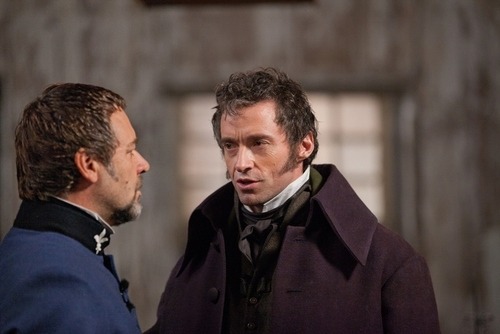
"Now life has killed the dream I dreamed."
Tom Hooper was no stranger to the world of directing when his last film The King's Speech exploded onto screens at the tail end of 2010, reaping the lion's share of awards including an Oscar for Best Director. Like so many directors that go from relative obscurity to unanimous acclaim, his next film was going to be bigger & showier in an attempt to show that his excellent work on The King's Speech was no fluke.
For his follow-up, he chose the biggest and showiest project imaginable, the epic of all epic musicals, Les Miserables. Did the gamble pay off? Read on to find out...

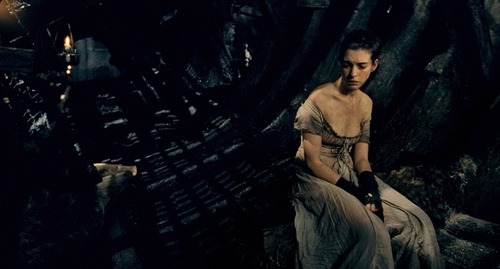
The musical Les Miserables is one of my favorite musicals of all time. It was the first Broadway show I ever saw back when I was in middle school, and it had a huge impact on me, turning me on to the world of theatre and, more specifically, musical theatre. One of the things that I love about Les Mis is how unabashedly theatrical it is. It is the kind of musical that works best with a huge ensemble cast, large sets, huge production numbers & rafter-shaking singers.
The most baffling thing about Tom Hooper's film of Les Miserables is how schizophrenic it is in this specific regard. At times the film has a huge scope, at other times it's small, tight & intimate, and at other times it's downright frenetic in its editing and pacing. This was more or less my overarching problem with the entire film. It could never settle down and decide what it wanted to be. Even the small, intimate solo numbers (all done in close-up, framed almost exclusively on the right side of the screen) all end with a sweeping crane shot that takes us up to the heavens to view the characters from afar.
The film's sole identity seems to be that it couldn't settle on one. It opens with a huge production number, with prisoners pulling a large battleship into port & seems as if it's going to be huge in scope. Moments later, Jean Valjean is soliloquizing in close-up, and the film seems to be settling in to a smaller, more intimate feel. The very next number "At the End of the Day," looks like it was cut in the middle of a grand mal epileptic seizure, cutting to another grimy extra every few seconds. And the film progresses much like this for the duration of its interminable 160 minute running time.
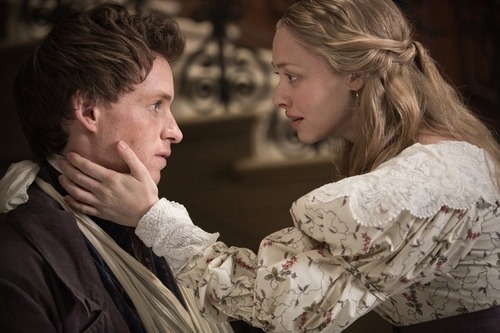
Anyone unfamiliar with the story, Les Miserables is set in the aftermath of the French Revolution & tells multiple stories that revolve around a man named Jean Valjean (Hugh Jackman) and his attempts to lead a virtuous life after being released from prison. Along the way he is pursued by a relentless police office, Javert (Russell Crowe), who is convinced that Valjean will return to a life of crime.
The story takes a number of diversions into subplots involving a woman who works at Valjean's factory named Fantine (Anne Hathaway) who is fired and turns to prostitution to care for her young daughter Cosette. After Fantine's death, Valjean swears to look after Cosette (played as an adult by Amanda Seyfried), and they find themselves living in a section of Paris that is home to revolutionaries, seeking to start a new revolution against the current king.
There are literally ten or more subplots in the film, and to go into detail would be exhausting and a bit redundant for people familiar with the show. Needless to say, they all work together to weave a beautiful tapestry of life in Post-Revolution France, and an epic story of good vs. evil, and the power of righteousness & devotion to God. Les Miserables is one of the most overtly religious musicals ever written, but speaking as a devout agnostic, I can say that this will not hinder your enjoyment of it in any way.
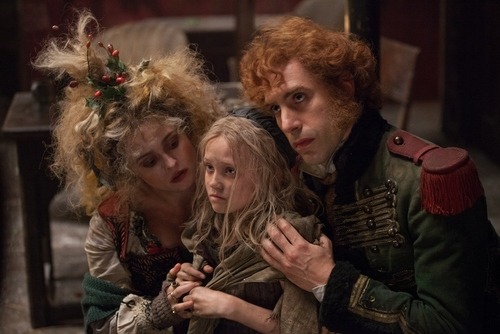
Hooper's direction is so woefully misguided, it will make your head spin. As I said before, it bounces between subtle, forced intimacy and frenetic group numbers, but it also varies wildly in tone. Take, for example, the handful of scenes involving the Thenardiers (Sacha Baron Cohen & Helena Bonham Carter), the innkeepers that have been watching Cosette while Fantine was working to provide for her. Their scenes are so hugely theatrical, to the point of being nonsensical. Cohen & Carter mug their way through every scene they're in, and feel as if they've wandered in from another movie. Their performances derail any sense of grounded naturalism that Hooper may have been going for, and only further illustrate why those moments of intimacy seem more out of place.
If I were to say that the film is worth seeing for one reason, it would be Anne Hathaway's performance. Her vulnerability and frailty are devastating, and her performance is almost certain to garner her an Academy Award. I'm honestly surprised that Hugh Jackman didn't just come out in a tuxedo right after her song and present it to her then. It would have saved us all a lot of time. The closest comparison I can think of is Catherine Zeta-Jones in Chicago. All I can remember thinking was, I wish everyone else was in the same movie she's in. That's how it felt with Hathaway, and the moment her character dies, the film does right along with her.
Jackman is perfectly serviceable as Valjean. His soliloquy after the Bishop gives him a reprieve is his emotional high point in the film. He mostly flounders when required to sing in a high register, and his rendition of "Bring Him Home" was particularly over-wrought. He wasn't bad, but he wasn't as fantastic as I wanted him to be. If he's getting any praise, it likely has more to do with the power of the role and less to do with his performance.
Samantha Barks as Eponine and Aaron Tveit as Enjolras are the other highlights in the cast, and that likely has to do with the fact that they are both veterans of the stage production of this show. Seyfried does the most she can with an entirely thankless role. Eddie Redmayne was okay as Marius, but in his upper register (which Marius spends a lot of time in), he sounded a bit like Kermit the Frog. Russell Crowe as Javert was just awful. I like Crowe as an actor, but he looked thoroughly uncomfortable. He wore one expression through the entire film and his two solo numbers are so boring and one-note, they'll have you checking your phone for missed calls. To be fair, Javert is a one-note character, but the best actors that have played this role have never let it show so brazenly before.
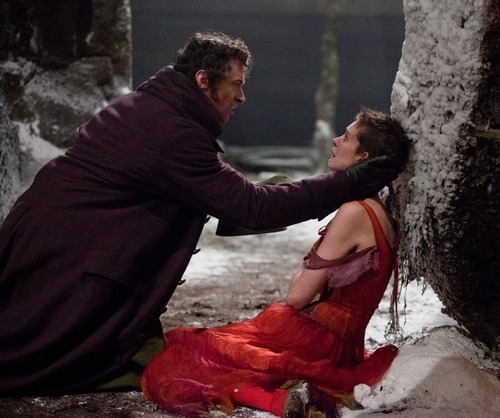
I suppose the power of Les Miserables is that it can survive a thoroughly mediocre production, which I can comfortably call this. I think the fact that I love the musical so much kept me from dismissing the movie outright. There's a reason the show has an intermission when it's presented on stage, and it's the fact that it's long and emotional and the audience needs a refresher. Pushing through the whole show just ends up exhausting the audience & severely diminishes the emotional impact of the finale.
If nothing else, Les Miserables proves that Hooper is not the great director we all thought he was. In small, intimate character studies, he knows his way around, but he flounders so often and in such spectacular fashion with this film that I almost feel like he's not that good of a director at all. The musical will survive in spite of this adaptation, and that is a testament to the power of the music & characters. I hope another director takes a crack at this musical in ten years and gives it the film it truly deserves.
GO Rating: 2/5

[Photos via BoxOfficeMojo]
No comments:
Post a Comment